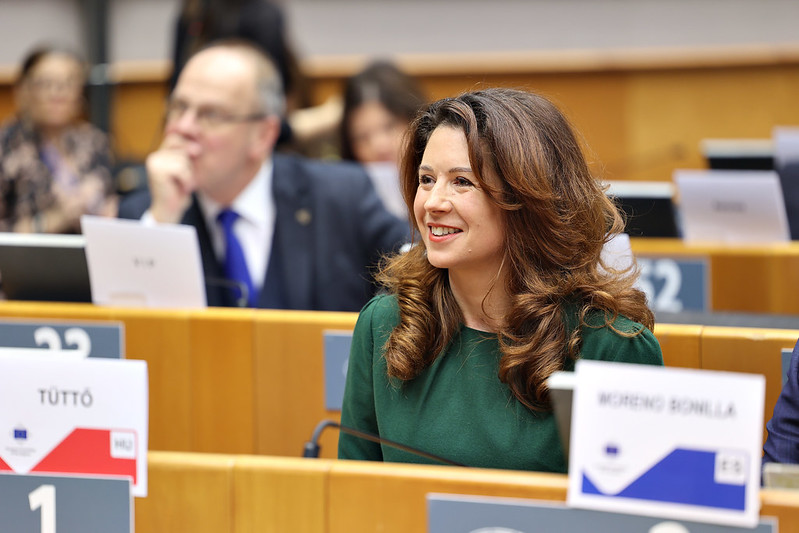“Trust local leadership” - an Interview with Kata Tüttő President of the European Committee of the Regions
- 16 Apr 2025

1. You have been recently elected President of the CoR – can you share insights into your political history, what guides your work approach and the values that inform your mandate?
I’ve been an elected local politician in Budapest since 2002, and I chose to stay at this level because local politics is where you see the real impact of your decisions. For me, politics has always been about being useful to all of my different communities. That simple motivation has guided my actions throughout. Over the past five years, as Deputy Mayor of Budapest responsible for public services such as transport, water, waste, energy, and climate, I navigated significant challenges: the COVID-19 pandemic, when most stayed home except those delivering essential services like public transport and waste collection; the energy crisis, where we faced skyrocketing prices of 8 to 12 times the norm; and after a decade without flooding, three floods in a single year. What matters in local government is taking responsibility. You make countless decisions every day—and you see and bear their consequences. Hopefully, more good than bad. Managing daily services in a city of nearly two million requires both pragmatism and vision. You have to know where you are and where you want to go. I was lucky to work alongside fellow leaders in a team rich in leadership experience. Together, we faced challenges none of us had encountered before. But we brought a diverse set of tools and perspectives to the table, allowing us to navigate the unknown. Thinking together, struggling together, laughing together, and surviving the waves taught me more than I could have imagined. That experience shaped me—and it’s what I bring to the CoR.
2. Given the recently proposed reform for modernising cohesion policy, how do you see cohesion policy contributing to the EU’s long-term investment priorities now and in the future? What role should regions play in shaping these decisions?
Cohesion policy is one of the EU’s most important stabilising tools. In times of growing uncertainty, we need to invest in stability. Cohesion policy is the long-term glue that holds the Union together. It should not be transformed into an ambulance fund for emerging crises. Yet, in the face of multiple transitions—green, digital, demographic, and geopolitical—it must be recalibrated. This demands a sensitive signalling mechanism between the EU level and local realities.
Cohesion policy already contributes to EU long-term investment priorities: improving connectivity, strengthening energy and water security, supporting education, health, and the social fabric, and boosting innovation and business diversity. It should flow like blood in a healthy body—reaching every part of the Union to maintain balance and functionality. But flow alone isn’t enough: it must be predictable, stable, and responsive to all dimensions of security—social, economic, environmental, and democratic. We want a Europe that is strong on the outside, and strong from the inside.
Modern cohesion policy must also embrace flexibility—but that cannot mean recentralisation. We must recognise the untapped potential of local and regional leadership and their capacity for innovation. Give us the tools, the trust, and the space to act. In uncertain times, cities and regions must be able to cut their own path to keep their communities safe and resilient.
3. As President of the CoR, you are in a privileged position to feel the pulse of regions through their elected officials. Do you feel the needs of communities and local governments have been appropriately taken into account in the recent policy shift?
The past five years have felt like a continuous training ground, with one crisis following another—pandemics, energy shortages, climate-induced disasters. These events have tested the resilience of our systems and exposed their fragility. In any complex system, without enough energy to sustain order, entropy increases and disorder grows. That is what we are witnessing: multiple shocks—especially rapid technological advances—are straining our institutions and social structures.
To address this, we must invest more energy into the system. That means activating and empowering all levels of governance—local, regional, national, and European. We cannot afford to leave any leadership capacity untapped. This is a time for shared responsibility, strategic foresight, and mutual trust.
In a world of accelerating change, only systems that mobilise all levels of leadership can adapt and survive.
4. How do you see the role of CoR and its relationship with the Commission in defining a long-term vision for cohesion policy?
The European Committee of the Regions has a very fruitful relationship with the European Commission. Since I was elected President on 20 February, I have been pleased to see Executive Vice-President Raffaele Fitto engage with CoR Members twice at our plenary meetings. On both occasions, he reasserted that cohesion policy must remain rooted in partnership, shared management, and a place-based approach.
What is our role as CoR? We connect complex, sometimes abstract, policies to reality on the ground. We translate legislation, and our mayors try to make it real. We signal back what is needed to make it work. The Commission sets the overall policy direction and legislative proposals, while we bring the regional and local realities into the policymaking process.
We seek meaningful conversations with the Commission—those where you assume the other person knows something you don’t. You listen, you learn, and you let that insight shape your actions.
This is essential for a long-term, functioning cohesion policy. The CoR ensures that the diverse stories of Europe’s regions and cities—from islands to mountain areas—are told. By working closely with the Commission, we can co-create strategies that address unique challenges across all territories, ensuring cohesion policy remains a cornerstone of European integration and solidarity.
5. What specific recommendations can the Committee of the Regions offer to make sure the proposed reforms meet the real needs of regions?
We digest legislation and signal back what we cannot digest. Some regions are ready to move fast; others need more time. One path may suit a capital city but not a mountainous area. Sometimes more resources are needed; other times, the resources are there but cannot be absorbed. Looking at EU averages tells us very little. Take job losses and creation in the automotive sector: we know how many jobs will be lost and hope to create others—but they often don’t align in time or place. A job lost now in one region and a job created years later in another country signal very real suffering.
We welcome the Commission’s proposal to make housing a new priority in Cohesion Policy. This is a need that mayors across Europe have been voicing for a long time, and it is encouraging to see it finally recognised.
I come from local leadership, and I know the innovation and capacity that exists there. Politics is about balance—and centralisation sometimes rises, especially in turbulent times. But the EU is not, and should not become, a centralised machine. We at the CoR will always push for decentralisation to balance the forces, because cohesion is a marathon—not a sprint. Long-term investments, like infrastructure or reskilling, take 10 to 15 years. If you constantly change priorities, you freeze everything. Cohesion needs stability to deliver impact.
"We at the CoR will always push for decentralisation to balance the forces, because cohesion is a marathon—not a sprint."


